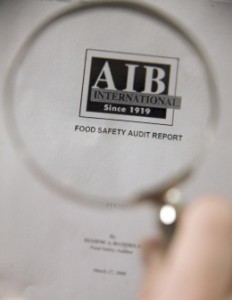The N.Y. Times writes an editorial about financial auditing, but use imagination and substitute food safety audit.
 Matthew Goldstein of The Times reported this week that an arbitration panel of three former judges has found no basis for a malpractice claim against Ernst & Young, the auditor of Lehman Brothers. The panel held that Lehman and its former executives were “more culpable than EY” for accounting maneuvers that misled investors about the firm’s financial condition before its catastrophic collapse in 2008.
Matthew Goldstein of The Times reported this week that an arbitration panel of three former judges has found no basis for a malpractice claim against Ernst & Young, the auditor of Lehman Brothers. The panel held that Lehman and its former executives were “more culpable than EY” for accounting maneuvers that misled investors about the firm’s financial condition before its catastrophic collapse in 2008.
Translation: When it comes to cooking the books, not being as guilty as someone else is the same as being blameless. That sounds appalling, and it is. But it echoes a misguided law from 1995 that set an exceedingly high bar for holding outside auditors liable — along with corporate management — for accounting fraud, a law that has encouraged slippery audits.
Even worse, the arbitration panel acknowledged that Ernst had “some hard data” about what Lehman was up to. What was unclear, the arbitrators said, was whether Ernst “had a duty” to review some of Lehman’s management decisions. But to even raise that question is flabbergasting. If an auditor is not reviewing management decisions that are reflected in the books that are being audited, it can hardly be said to be performing an audit.
Ernst has argued all along that Lehman’s accounting tactics, deceptive or not, complied with generally accepted accounting principles. That may be so, but it is a dubious defense for one of the biggest firms in a profession that is presumably based on integrity.
The problem is larger than Ernst and goes beyond this specific case, which was brought by the holding company charged with recovering and selling Lehman’s assets and paying off creditors. The big auditing firms are virtually never the first to uncover and publicly report financial frauds; credit for that goes to the press, whistle-blowers, hedge funds, independent research firms, bankruptcy trustees or regulators. With each failure by auditors to sound warnings, it becomes increasingly clear that the investing public is being shortchanged when it comes to the reliable information it needs to make sound investing decisions.
 Among many needed reforms is a revamped system in which audits are paid for not by company management, but by fees that companies pay to a public entity for the purpose of financing audits. In the near term, the Securities and Exchange Commission should require audited statements to be signed by the lead auditor, rather than merely affixing the firm name.
Among many needed reforms is a revamped system in which audits are paid for not by company management, but by fees that companies pay to a public entity for the purpose of financing audits. In the near term, the Securities and Exchange Commission should require audited statements to be signed by the lead auditor, rather than merely affixing the firm name.
Audits and inspections are never enough: A critique to enhance food safety
30.aug.12
Food Control
D.A. Powell, S. Erdozain, C. Dodd, R. Costa, K. Morley, B.J. Chapman
Internal and external food safety audits are conducted to assess the safety and quality of food including on-farm production, manufacturing practices, sanitation, and hygiene. Some auditors are direct stakeholders that are employed by food establishments to conduct internal audits, while other auditors may represent the interests of a second-party purchaser or a third-party auditing agency. Some buyers conduct their own audits or additional testing, while some buyers trust the results of third-party audits or inspections. Third-party auditors, however, use various food safety audit standards and most do not have a vested interest in the products being sold. Audits are conducted under a proprietary standard, while food safety inspections are generally conducted within a legal framework. There have been many foodborne illness outbreaks linked to food processors that have passed third-party audits and inspections, raising questions about the utility of both. Supporters argue third-party audits are a way to ensure food safety in an era of dwindling economic resources. Critics contend that while external audits and inspections can be a valuable tool to help ensure safe food, such activities represent only a snapshot in time. This paper identifies limitations of food safety inspections and audits and provides recommendations for strengthening the system, based on developing a strong food safety culture, including risk-based verification steps, throughout the food safety system.
